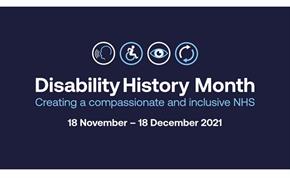
To mark Disability History Month, Garry shares his experience with Autism.
As a child at school in the sixties and seventies almost nothing was known about learning, social or communication disabilities. The terms Autism, Dyslexia and ADHD were simply unknown. Children who could not spell were considered unintelligent and those who were constantly distracted were just naughty.
My first school report aged five described me as an introverted extrovert which was quite accurate. After a house move at my second primary school I was often in trouble for my behaviour in class and regularly hit by the teacher. I was also told off for my tics and twitching. I had no control over this.
However, at the Eleven Plus I surprised everyone (and myself) by being the only boy in my school to pass and go to Grammar school.
For the first two years at Grammar school, I was top of the class in multiple subjects but excelled in English, History and Chemistry. I was liked by the teachers and never considered problematic. However, by the third year I began to lose my way.
If there was a subject I didn’t like such as metal work, woodwork, Applied Science and Technology, or Physics, I would simply stop trying and switch off. I began to do very badly in all these subjects as I liked words but not science and hated making things.
Curiously I was also a very talented athlete and hold records to this day. I never really enjoyed running but just happened to possess the right genes. One weekend in year three I was asked to run for the school but there was a clash of dates, and my sense of loyalty was with the Athletics club where I had started out. Consequently, my PE teacher had me banned from running for the school or county, although I was the current Kent champion at 1500m and cross country.
I never ran for either again and felt cut off from the school. In sixth form I transferred to another Grammar and did very well. They took me on for my athletic ability and got me running again. I only lasted eight months before leaving. I later took ‘A’ levels at Woolwich College and started a degree at Thames Polytechnic before dropping out again.
This formed a lifelong pattern whereby I would start a new job or course of education with huge enthusiasm and high hopes. Within months I would become disillusioned and quit. During this time, I was not diagnosed as Autistic. There was no knowledge of the condition either in education or the workplace.
At twenty-five I had a dramatic conversion to Christianity and once again went in full steam ahead. A similar pattern ensued, and I left my first church for a Christian discipleship college as it was more radical. I did get married at that college and have been for 29 years!
In married life I did settle more but still went from job to job. Having decided to get I.T literate I stumbled upon another ability and did very well. This time the company went bust, I ended up working in London on a long commute and in 2002 had a mental breakdown at work at 9am.
Having quit my career we started a small church congregation which we ran for five years before serving another twelve years as foster carers. I forgot about careers. Fostering Autistic children alerted my wife to some similarities. I made enquiries and in 2013 after a two and a half year process I was finally diagnosed with Asperger Syndrome, or Autistic Spectrum Disorder (ASD).
For me this was a transformative moment that helped to explain my past difficulties in work and education. I did a lot of research on the condition which I found very helpful. I began to understand why I had difficulties in social groups and was often misunderstood. Also, why I suffered form extreme levels of frustration with heightened anxiety and chronic depression. Medication helped me to control these symptoms as opposed to them controlling me.
I also saw new possibilities to redeem my lost education. Having simply attended a taster days at Anglia Ruskin University (ARU) I was offered an interview which was successful.
The following three years were still a roller coaster with difficulties adjusting to study and greater difficulties on placement with extended commute times. However, regarding disability, ARU were superb. I was given a statement of reasonable adjustment and allocated a disability mentor which made a huge difference. I was able to set goals, retain focus and improve my standard of work as time progressed eventually graduating with a First. I could also have an advocate in any meetings regarding placement difficulties.
I now have a PG Cert and work as a Paramedic and University Lecturer. I am grateful for my second chance.
Garry Cockrill – Paramedic and lecturer in Paramedic Science
Published 29th November 2021